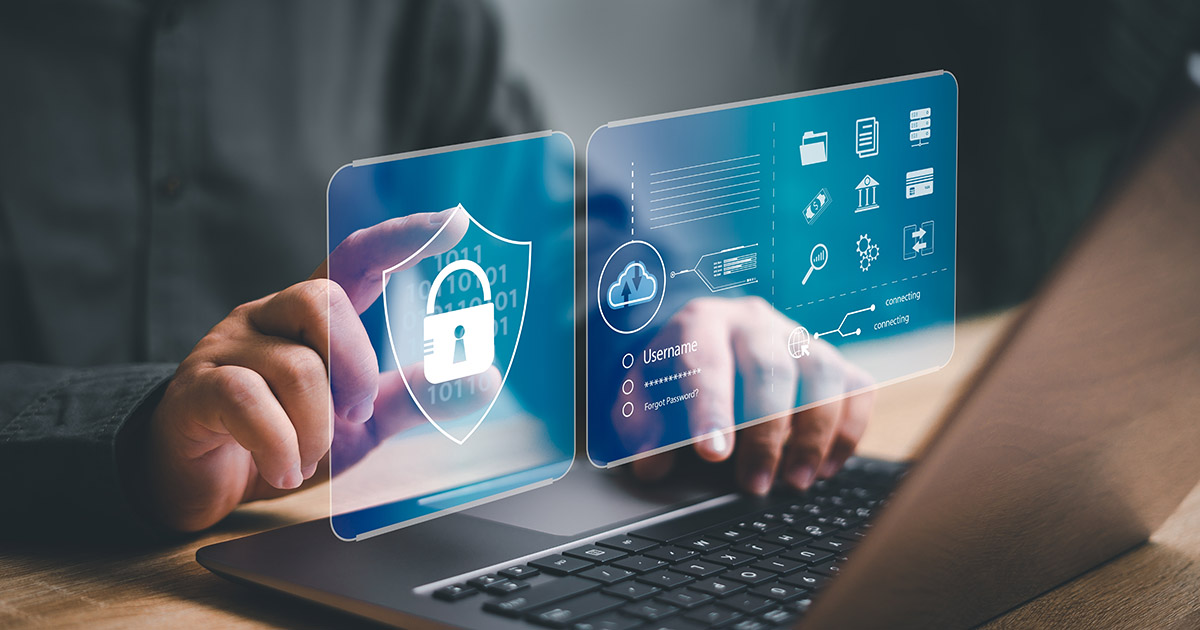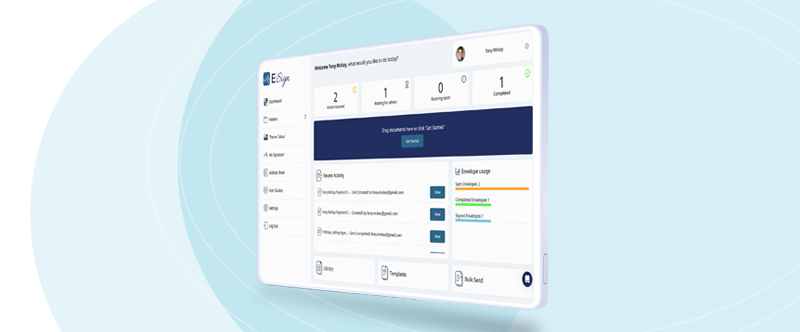Home | News and Insights | What is Cyber Security?

16th Apr, 2024
As the digital landscape continues to grow and become increasingly complex, cyber security is more important now than ever. In this guide, we will be defining what cyber security is, the benefits of it, and how E-Sign ensures maximum cyber security for users of our e-signature platform and digital document solutions.
Cyber security is the process of implementing technologies and controls to protect networks, systems, devices, and data from attacks carried out by hackers. The role of cyber security is to reduce the risk of cyber attacks and make sure that individuals and businesses can safely manage their digital presence. An effective cyber security system typically involves the entire organisation not just the technology, including the processes and the people.
The UK government actively encourages organisations to improve their cyber security and better protect themselves through various schemes such as Cyber Essentials. By becoming Cyber Essentials certified, businesses can demonstrate to their customers that they take security seriously and have strict processes in place to protect sensitive data.
Cyber security is just one part of the larger concept of information security and whilst the main goal of cyber security is to protect programs and devices from attacks, information security is more concerned with maintaining the confidentiality, integrity, and availability of information. There are different types of information and cyber security that it is important to be aware of, including:
There are many benefits to establishing a robust cyber security system in your organisation, which we will discuss below.
One of the biggest benefits of cyber security is that it can protect your business and its reputation. A comprehensive system can ensure that your employees can complete their daily tasks with minimal risk of an attack occurring. Also, keeping your system secure is essential to maintaining a positive business reputation. Attacks and data breaches can break trust with customers and cause irreparable damage to your reputation. Therefore, cyber security should be a priority for organisations wanting to protect their operations and customer relationships.
Attacks and viruses can have a significant impact on networks, workflows, and functioning. This is because they slow down your team’s productivity due to the downtime required fixing problems and removing viruses. Productivity can become more efficient with improved firewalls, virus scanning, and automated backups. In addition, productivity can be increased by educating employees on cyber security practices and helping their awareness of potential attacks such as phishing, ransomware, suspicious links, and other targeted activities.
Any downtime a business experiences can result in substantial losses, not only through operations being shut down, but also the risk of paying a fine for a data breach or a ransomware attack. A good cyber security system can reduce the risk of breaches and provide your business with a cost effective solution to protect from vulnerabilities.
Regulatory bodies play an important role in protecting organisations from cyber attacks with compliances like GDPR in place, to support businesses in taking the necessary steps to implement suitable security measures. Also, often different regulations will require testing to show their resilience and effectiveness against cyber threats. So having a cyber security system can safeguard business continuity and ensure any relevant regulations are adhered to.
Despite there being many benefits to it and its reliable efficiency in protecting individuals and organisations, there are consistently developing challenges that face cyber security. One of the most prominent examples is the growing risk of AI attacks. Artificial intelligence has opened up new possibilities for businesses working digitally, but this also allows cybercriminals to utilise AI to carry out attacks.
For example, AI could be used for impersonation and making phishing and deep fakes seem more legitimate, making it more dangerous for social engineering attacks. In addition, criminals may use AI to test the efficacy of malware, poison AI models with inaccurate data, and a wide range of other methods of compromising an organisation’s existing AI systems.
New technological developments also present challenges to cyber security as solutions need to keep up with the advancements in order to minimise risks and protect vulnerabilities. This includes the latest developments in electronic signatures and digital identities. It was recently revealed that updates to the eIDAS regulation (eIDAS 2.0) will introduce Digital Identity Wallets (DIW), allowing individuals to securely store and manage their digital identity in one platform. Whilst this will help to streamline the identity verification process for people and businesses, there is a greater inherent risk that needs to be accounted for with suitable solutions.
Cyber threats aren’t going away, in fact the more technology develops, the more opportunities there are for cybercriminals to become more sophisticated with their attacks. As well as data breaches which are a highly common threat, there are other prominent challenges to cyber security such as:
Our authentication and verification methods are second to none, ensuring our users signatures are fully secure and legally binding. The E-Sign platform is protected by an SSL encryption and each signature comes with a full digital audit trail and a certificate of completion, confirming its authenticity. In addition we have anti-tampering controls in place to allow for unalterable, systematic capture of signing data. With stringent two-factor authentication and ID verification, we can securely verify the identity of both users and document signers before they are permitted access to sensitive data.

As an industry leading eSignature provider, security is the foundation of everything we do at E-Sign, with various robust protocols and systems in place to protect our users and their data. We have made sure we have the latest and best security tools throughout our systems, with a particular focus on high value or high risk touchpoints and integrations. For example we have:
Furthermore, our subscriber data is encrypted in accordance with industry best-practice standards which sets us apart from other UK e-signature providers. This has even enabled us to become the only provider trusted on the Public Service Network (PSN). The PSN is the UK Government’s high security network and being on it demonstrates our implementation of the highest security standards and that we have met strict regulatory requirements.
Our security capabilities protect the integrity of your digital services, providing complete assurance that our solutions will strengthen your cyber security measures and never compromise them.

Many organisations who are looking to improve their cyber security systems might be considering utilising an electronic signature platform and wondering whether it is safe. This is understandable as your signature is a core part of your identity and applying it to a document can have various meanings and implications. However, you can rest assured that eSignatures are completely safe.
The combination of enforceable regulations, strict criteria to ensure accurate verification, and modern technologies and security measures all work together to make digital signatures equally valid to handwritten ones and actually more secure with the risk of forgery massively reduced.
Cyber security is a crucial part of the digital world that protects us from threats and supports organisations in carrying out their daily operations safely. It’s important that any system or platform you use in your business has demonstrable security measures in place to protect yours and your customers’ data. If you’re looking for an efficient eSignature and digital document management solution for your organisation, E-Sign can help.
Contact us today to discuss your specific requirements as our plans can be tailored to your business, whether you’re a small company or a large enterprise. You can also get started with us by giving the platform a try via our 14-day free trial. This will give you a first-hand look at how E-Sign can benefit your business, offering a secure and seamless way to send and sign documents in just a few clicks.